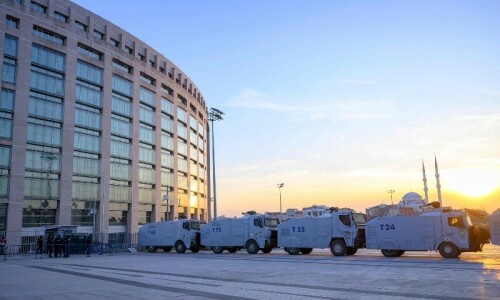MUCH of the politics of Balochistan is shaped by the province’s myriad sardars, with the Bugtis, Marris and Mengals counted among the major tribal players. But for historical reasons, one tribal chieftain seems to loom large over the Baloch political landscape: the Khan of Kalat.
The present holder of this title — Mir Suleman Dawood Jan Ahmedzai — is currently in self-exile in the United Kingdom and has been in the news of recent for two major reasons. Firstly, there is talk of the Khan being wooed in order to influence the ‘angry’ Baloch to return to the national mainstream, while secondly, the Khan’s palace in Kalat was raided by intruders, apparently at the behest of his estranged son Prince Mohammed, who reportedly made off with priceless objects.
Both these events seem contradictory: in the first instance the state seems to be interested in opening the channels of dialogue with Mir Suleman, while in the second instance it appears that nothing was done by the administration to protect his Kalat residence from the intruders.
Mir Suleman is the 35th Khan of Kalat. The Brahvi-speaking Khan is said to have received his initial education in Lahore and Quetta. He became head of the erstwhile Kalat State following the death of his father Mir Dawood Jan. Observers familiar with the politics and history of Balochistan say Mir Suleman shares many traits with his grandfather, Mir Ahmad Yar Khan, who acceded to Pakistan in 1948. Among these traits is reportedly a soft corner for the federation.
However, with the death of Nawab Akbar Khan Bugti in 2006 in a military operation, Mir Suleman’s stance seemed to change. It is said that even before Nawab Bugti’s death Mir Suleman had warned then president Pervez Musharraf, who was on a visit to Kalat at the time, not to adopt a hard line on Balochistan. Following Bugti’s death, the Khan of Kalat called a grand jirga of over 80 sardars and tribal elders from Balochistan, Sindh and Punjab, where it was decided that he should take the case of Kalat’s restoration as an independent entity to the International Court of Justice in The Hague. He also made public the Instrument of Accession thereafter. Interestingly, another version of events says that the Khan actually objected to Baloch pro-independence slogans raised at the jirga.
Following these developments, after leaving Pakistan and making his way through a number of Gulf states, Mir Suleman ended up in the UK, where he reportedly applied for asylum. He has since been campaigning for Baloch rights, particularly the province’s rights to royalties from gas, minerals, etc.
As for Prince Mohammed, Mir Suleman’s only son, observers say the man is young — said to be in his early 20s — and untested and has no political background. Reportedly married into the Bugti tribe, he is believed to be currently living in Quetta, with apparently close links to the state. However, he is said to be estranged from his father.
Though the Khan of Kalat has himself been away from the political scene for close to a decade, various members of his family have continued to be part of Balochistan’s politics. It remains to be seen whether the Balochistan administration’s efforts to convince the Khan to return home will bear fruit. However, if rumours that the establishment is trying to install Prince Mohammed as the new Khan of Kalat have any substance, efforts to reintegrate Mir Suleman into the mainstream may be dead in the water.
Yet if the effort is handled with care and tact and the state is able to convince Mir Suleman to return, this may indeed have a positive impact — considering the Khan’s stature in Baloch society — to resolve Balochistan’s multiple crises through peaceful means.
Published in Dawn, July 1st, 2015
On a mobile phone? Get the Dawn Mobile App: Apple Store | Google Play















































